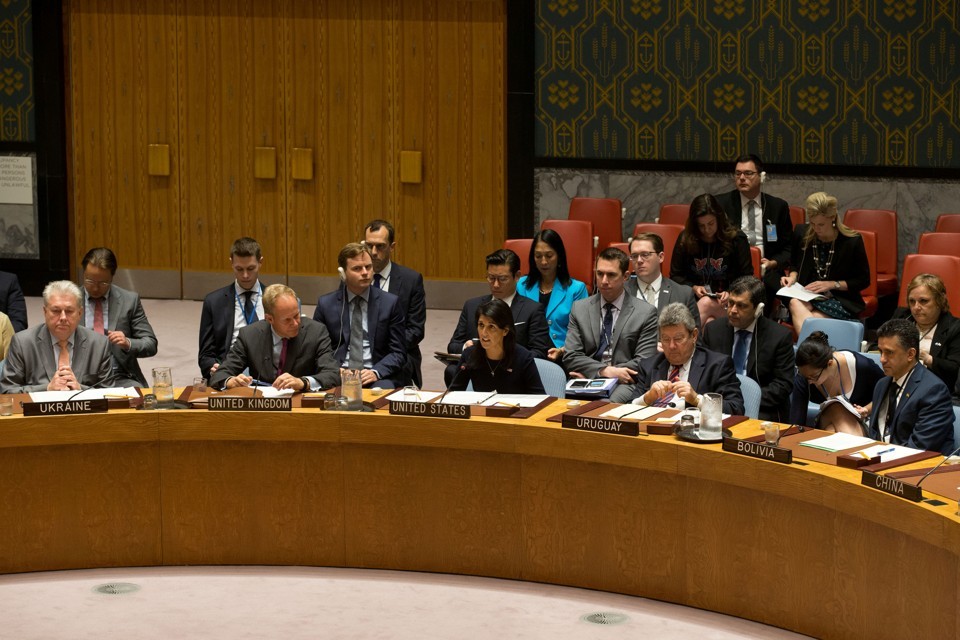The United Nations Security Council unanimously approved on Monday new sanctions against North Korea that bans it from importing all natural gas liquids and condensates.
The sanctions were not the toughest-ever measures sought by the administration of US President Donald Trump that had vowed to ban all oil imports and freeze international assets of the government and its leader, Kim Jong-Un.
The resolution was a response to Pyongyang’s sixth and strongest nuclear test explosion that it carried out on September 3 and which it alleged to have test a hydrogen bomb, drawing international alarm and condemnation.
The sanctions cap Pyongyang’s imports of crude oil at the level of the last 12 months, and it limits the import of refined petroleum products to 2 million barrels a year. They also ban all textile exports and prohibit any country from authorizing new work permits for North Korean workers — two key sources of hard currency for the northeast Asian nation.
The watered-down resolution does not include sanctions that the US wanted on North Korea’s national airline and the army.
Nonetheless, US Ambassador Nikki Haley told the council after the vote that “these are by far the strongest measures ever imposed on North Korea.” But she stressed that “these steps only work if all nations implement them completely and aggressively.”
“Today we are saying the world will never accept a nuclear armed North Korea,” she said. “We are done trying to prod the regime to do the right thing” and instead are taking steps to prevent it “from doing the wrong thing.”
“The North Korean regime has not yet passed the point of no return,” she said. “If it agrees to stop its nuclear program it can reclaim its future. If it proves it can live in peace, the world will live in peace with it. … If North Korea continues its dangerous path, we will continue with further pressure.”
The final agreement was reached after negotiations between the US and China, the North’s ally and major trading partner. Haley said the resolution never would have happened without the “strong relationship” between Trump and Chinese President Xi Jinping.
But its provisions are a significant climb-down from the very tough sanctions the Trump administration proposed last Tuesday, especially on oil, where a complete ban could have crippled North Korea’s economy.
The cap on the import of petroleum products could have an impact, but North Korea will still be able to import the same amount of crude oil that it has this year.
The textile ban is significant. Textiles are North Korea’s main source of export revenue after coal, iron, seafood and other minerals that have already been severely restricted by previous UN resolutions. North Korean textile exports in 2016 totaled $752.5 million, accounting for about one-fourth of its total $3 billion in merchandise exports, according to South Korean government figures.
Haley said the Trump administration believes the new sanctions combined with previous measures would ban over 90 percent of North Korea’s exports reported in 2016.
As for North Koreans working overseas, the US mission said a cutoff on new work permits will eventually cost North Korea about $500 million a year once current work permits expire. The US estimates about 93,000 North Koreans are working abroad, the US official said.
The original US draft would have ordered all countries to impose an asset freeze and travel ban on Kim Jong-Un and four other top party and government officials. The resolution adopted Monday adds only one person to the sanctions list — Pak Yong Sik, a member of the Workers’ Party of Korea Central Military Commission, which controls the country’s military and helps direct its military industries.
The original US draft would also have frozen the assets of North Korea’s state-owned airline Air Koryo, the Korean People’s Army and five other powerful military and party entities. The resolution adds only the Central Military Commission of the Workers’ Party of Korea and the party’s powerful Organization and Guidance Department and its Propaganda and Agitation Department to the sanctions blacklist.
In its first reaction to the sanctions, North Korea rejected the resolution and said the US would soon face the “greatest pain” it had ever experienced.
Pyongyang’s ambassador Han Tae Song, addressing the UN-sponsored Conference on Disarmament in Geneva, said: “The Washington regime fired up for political, economic, and military confrontation, (is) obsessed with the wild game of reversing the DPRK’s development of nuclear force which has already reached the completion phase.”
The weakening of the sanctions reflects the longstanding rift between sanctions hawk Washington, and China and Russia, which advocate direct talks and more efforts to find a resolution through negotiations. The US has rejected proposals from both countries that it stop joint military exercises with South Korea in exchange for a halt to North Korea’s nuclear and missile tests.
Both Beijing and Moscow had strong words for Washington.
China’s UN ambassador urged the council to adopt the freeze-for-freeze proposal and urged the US to pledge not to seek regime change or North Korea’s collapse. Russia’s envoy said Washington’s unwillingness to have UN Secretary General Antonio Guterres try to resolve the dispute “gives rise to very serious questions in our minds.”
South Korea’s presidential Blue House said on Tuesday the only way for Pyongyang to end diplomatic isolation and become free of economic pressure was to end it nuclear program and resume dialogue.
“North Korea needs to realize that a reckless challenge against international peace will only bring about even stronger international sanctions against it,” the Blue House said.
Japanese Prime Minister Shinzo Abe quickly welcomed the resolution and said after the vote it was important to change North Korea’s policy by imposing a higher level of pressure.
